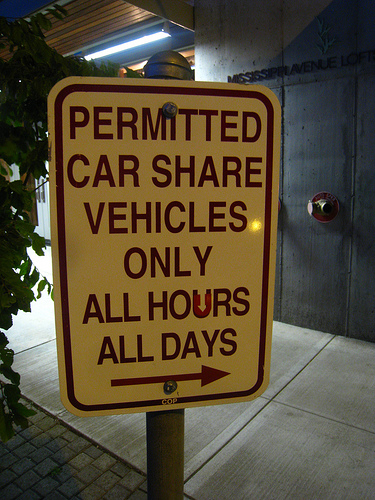What if a stupendously enormous business opportunity were hiding in plain sight before our eyes? What if this same business opportunity would bring gigantic environmental and social dividends? And what if all that was required to unleash these benefits was a simple legal reform?
Personal car sharing is such a business opportunity: a chance to trim emissions, crashes, and fuel costs, all while generating a profit for car owners and giving everyone a new way to save money. Only one legal barrier—an obscure change to insurance regulations—stands in the way.
The Pacific Northwest’s rolling stock of cars and trucks constitutes a mind-boggling amount of underutilized capital. The region has substantially more motor vehicles than licensed drivers. Everyone in the region could climb into a vehicle and no one would have to sit in the backseat. What’s more, the typical car is parked 23 hours a day. Most of us have more money tied up in our cars than in any other physical assets aside from our homes, and all that wealth is just sitting there in the driveway depreciating.
But circumstances are ripening to turn this colossal overstock into an equally massive economic and environmental opportunity.
Hard economic times, especially for the young; rising environmental concern and collaborative, nonconsumerist lifestyles; high energy prices; and the galloping spread of smart phones and social networking have given birth to a handful of start-up companies, such as Relay Rides and Getaround, intent on creating an online marketplace for private cars’ idle hours.
Such a market will give us a capitalist way to downsize our auto fleet. The profit potential is enticing. Imagine leaving town for a week and coming back to learn that your vehicle had earned you $300 on the rental market. Or imagine that your car-sharing membership gave you access, on a moment’s notice, to thousands of private cars and trucks sprinkled around your city. Why endure the expense and hassle of car ownership when you can drive any make or model you choose and only pay for what you use?
The appeal of these economics explain the rapid growth of personal car-sharing. As of May 2011, for example, car-sharing pioneer Getaround had one fifth as many cars in its network after a few months as Zipcar had in its fleet after 11 years.
Its growth may be powered by pocketbook considerations, but personal car-sharing has equally impressive nonmonetary benefits. Specifically, car-sharing shrinks our footprint. When people pay for their transportation by the trip, rather than by the vehicle, they drive less—44 percent less, on average, among car sharers studied by UC Berkeley’s Susan Shaheen. They use alternatives more. Car ownership is like an all-you-can-eat restaurant. Once you’ve paid the entrance fee, you might as well gorge. But car sharing gives us new chances to save money for each trip we don’t drive. What’s more, as car-sharing grows, it becomes an ever-more-attractive option: the more vehicles enrolled, the better car-sharing works.
Why has such a huge opportunity remained unredeemed? Insurance.
Turning your driveway into a part-time car-rental lot invalidates your auto insurance, and even if your car-sharing company brings its own insurance (they all do), the blurry line between the owner’s liability and the renter’s has been enough to hobble the nascent industry.
Fortunately, California passed a law in 2010 creating a clear division of responsibility for insurance: when any car is hired through a car-sharing company, it’s on the car-sharing insurance plan, not the owner’s. This law passed unanimously through the California legislature, which is why California is now the hotbed of personal car-sharing, with three dueling start-ups.
This month, Oregon’s legislature passed—and Governor Kitzhaber inked—a similar bill, making the Beaver State an attractive new territory for car-sharing entrepreneurs. (See this blog by car-sharing pioneer Dave Brook for updates from Oregon.) Idaho, Washington, and British Columbia can welcome the car-sharing wave by quickly amending their own insurance regulations. In Washington, the legislature would also do well to exempt car-sharing from the state’s heinous and retrograde 9.7 percent car rental tax. In British Columbia, the Insurance Corporation of British Columbia and its regulators at the BC Utilities Commission can follow Oregon’s lead, combing BC’s insurance rules to allow personal carsharing. BC car-sharing pioneer, the coop Modo, is eager to launch personal car-sharing itself. It is closely watching developments in California, Oregon, and Quebec, where Communauto has launched Canada’s first personal car-sharing program, according to marketing director Bernice Paul.
Allowing an hourly market for off-duty cars could make a big contribution to creating healthy, lasting prosperity. It’d give more people ready access to a car without having to buy one (or a second one). It would shrink the over-capacity in the vehicle fleet and drive steep reductions in how much driving we do—in ways that generate profits (or savings) for both car owners and nonowners. Along the way, it would help stabilize the climate by preventing greenhouse gas emissions, help reduce traffic congestion by tamping down discretionary trips, help liberate parking spaces for other uses, help create jobs by keeping dollar circulating locally (rather than leaving the region to buy vehicles and fuel), help save lives (by reducing car wrecks and, perhaps, obviating oil wars), and help make us all fitter and trimmer (by spurring us to walk more).
All that’s required is that we fix some insurance rules.
Sightline’s Making Sustainability Legal project identifies specific regulatory barriers to affordable, green solutions. If you’ve come across such an obstacle, please let us know by writing Eric (at) Sightline (dot) org.










KnittyBiker
Hm. I’m an avid car-sharer, and while I think this is a nice idea in principle, I think it’s a really, really tough sell. Good luck to those California startups.
People are really attached to their cars – and no wonder. They’re expensive! There are all kinds of cleanliness and damage concerns on the owner’s part, and minimum standards demanded by the clients.
To donate your vehicle in this way you already have to be distant from it to some degree – to view it as “just an appliance”.
I think you overestimate the money to be made. The highest car-sharing rate here in Vancouver is $15/hour, and part of this would have to go to the 3rd party doing the renting for you. If I look at my local car-co-op’s utilization rate, I think you’d be lucky to have your car used 4-6 hours over a weekend, on average.
There are probably some “goldilocks” cars around, in just the right place, with just the right owners, not too new and not too old, probably “extra” 2nd (or 3rd…) cars, that might be suitable for this type of sharing, but I’m not holding my breath for my suburban neighbours to start sharing their totally underutilized minivans with me. Unfortunately.
Alan Durning
Thanks for your note and for sharing your experience.
I would have agreed with you about the widespread reluctance among car owners, until I heard about the experience that California car-sharing companies are having in launching personal car-sharing there. They are having few problems signing up car owners who are interested in renting out their vehicles. Car renters are in somewhat more limited supply so far, as I understand it. There’s a network effect, as I’m sure you know, in car sharing. Until potential renters truly believe in the system, they’re reluctant to entrust their transportation to it. The network has to be big, redundant, and robust, before it really takes off. But owners are not the limiting factor so far.
Relay Rides and Getaround have different pricing models. In Getaround, owners can set any price they want. Someone in San Francisco is renting out a Tesla through Getaround for more than $30 an hour, if I remember correctly.
Some car-sharing owners in the Bay Area are starting to think about their cars as income generators, and they’re starting to promote car-sharing among their friends and neighbors. They are becoming marketing agents themselves. In such a circumstance, the earnings potential are quite substantial, I think. In others, the earnings potential would likely be quite modest, as you say. In any event, I didn’t say $300 over a weekend. I said $300 over a week. And I didn’t mean to imply that would be an average week. At $10/hour, after a 40 percent cut for the car-sharing company, that assumes rentals for 50 hours: a lot for a single week but entirely impossible. A typical owner might aspire to earn $300 a month through car-sharing, which would still be enough to cover many of the costs of ownership.
Again, thanks for your comments.
Alan Durning
Correction: The Tesla goes for $50/hour, as noted in today’s USA Today article: http://travel.usatoday.com/news/story/2011/06/Personal-car-sharing-takes-off-as-states-ease-insurance-laws/48725904/1?csp=34news&utm_source=feedburner&utm_medium=feed&utm_campaign=Feed%3A+usatoday-NewsTopStories+%28News+-+Top+Stories%29
And, as I noted, Getaround estimates earnings of $200 to $300 a month (not a week) for owners. That assumes just 1 hour a day of rentals.
Viviann
People rent out their homes. They see them as business opportunities. Why not cars?
Alexandra potaz
Changing insurance rules might be tough with those big insurance companies, but it’s cool that California & Oregon made some headway. I live in SF & never realized that my car sleeps 23 hours in a day – wish I could do that. After searching about this p2p sharing idea, USA today talked about 4 companies in SF mentioning JustShareIt & SprideShare.
http://travel.usatoday.com/news/story/2011/06/Personal-car-sharing-takes-off-as-states-ease-insurance-laws/48725904/1
Its cool that other companies are getting into this circle & JustShareIt does more than just cars. Once folks catch on, who knows what else folks will share.
izza302
The idea of car share is excellent. The topics posted here in this site are really interesting and there are really good information that were presented. PDA Faceplates
MichelleP
Maybe in our sustainability-oriented forward-thinking culture, we should be concentrating more on green ideas that encourage us to share-a-moped rather than share-a-car?
Eric Doherty
This is a great development, and one that has the potential to reduce the number of gas guzzling trucks on the road. I used to have a van, now when I need a van or pickup I use a Modo car co-op vehicle. But car co-ops are only easy to set up in the denser parts of cities.
With this system, even people in rural areas could have convenient access to a truck without owning one.